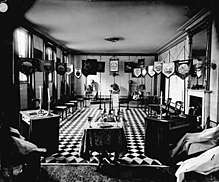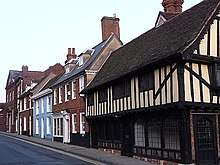Freemasonry in Suffolk
Freemasonry in Suffolk dates back to 1772 when the Suffolk "Province" was founded.[1] In 2008 the current Provincial Grand Master of Suffolk, Barry ross, claimed they had 3,000 members organised in 66 lodges. They operate out of 21 centres, he added.[1] The Freemasons' Hall was built in Soane Street, Ipswich in 1897. It is a grade II listed building run by the Ipswich Masonic Hall Trust.[1]

In accordance with the Suffolk Code, councillors in Suffolk are asked to declare whether they are a Freemason.[2]
History
Ipswich Royal Ark Masons
There are claims that Royal Ark Masons started in Ipswich in 1772, but the documentary evidence only goes back as far as 1789, when Ebenezer "Noah" Sibley and a Mr Wood arrived in Ipswich. The group is sometimes described as "irregular" or "quasi-masonic", as it was formed in order to have a political impact.[3]
United Grand Lodge of England
In 1886 Robert Adair, 1st Baron Waveney was the United Grand Lodge of England Provincial Grand Master of Suffolk until his death on 15 February. There were over 800 freemasons in Suffolk distributed in 22 craft lodges:[4]
| Lodge No. | Lodge name | Location | Membership | Notes | |
|---|---|---|---|---|---|
| 71 | Unity | Lowestoft | 72 | ||
| 81 | Doric | Woodbridge | 50 | ||
| 114 | British Union | Ipswich | 47 | ||
| 225 | St. Luke | Ipswich | 93 | Some material archived at the Suffolk Record Office, Ipswich[5] | |
| 305 | Apollo | Beccles | 20 | ||
| 332 | Virtue and Silence | Hadleigh | 27 | ||
| 376 | Perfect Friendship | Ipswich | 68 | ||
| 388 | Prudence | Halesworth | 34 | ||
| 516 | Phoenix | Stowmarket | 41 | ||
| 555 | Fidelity | Framlingham | 35 | ||
| 929 | Waveney | Bungay | 30 | ||
| 936 | Adair | Aldeburgh | 22 | ||
| 959 | Prince of Wales | Ipswich | * | ||
| 1008 | Royal St. Edmund | Bury St. Edmunds | 49 | ||
| 1224 | Stour Valley | Sudbury | 61 | ||
| 1452 | St. Margaret | Lowestoft | 25 | ||
| 1592 | Abbey | Bury St. Edmunds | 31 | ||
| 1631 | St. Andrew | Gorleston | 30 | ||
| 1663 | Hertismere | Eye | 23 | ||
| 1823 | Royal Clarence | Clare | * | ||
| 1983 | Martyn | Southwold | 25 | ||
| 9194 | Court Knoll | Boxford | 39 | * = No returns |
Masonic buildings in Suffolk
| Wikimedia Commons has media related to Masonic buildings in Suffolk. |
| Location | Building name | Notes | Image |
|---|---|---|---|
| Chequer Square, Bury St Edmunds | Masonic Hall | Six masonic lodges meet at this hall situated in Chequer Square, at the junction of Churchgate Street and Angel Hill.This is a Grade II listed building, formerly the Six Bells Inn.[6] |  |
| Soane Street, Ipswich | Ipswich Masonic Hall | Located at far end of photograph. This is a Grade II listed building.[7] |  |
| North Street, Sudbury | Masonic Hall |  | |
References
- Marston, James (2008). "Inside the Masons - dispelling the myths". Ipswich Star (27 August 2008). Ipswich Star.
- Bristow, Tom (2017). "Should councillors have to tell us if they are Masons?" (17 November 2017). Eastern Daily Press.
- Sommers, Susan Mitchell (2002). Parliamentary Politics of a County and Its Town: General Elections in Suffolk and Ipswich in the Eighteenth Century. Westport, CT: Greenwood Publishing Group. ISBN 9780275975135.
- "Freemasonry in Suffolk" (PDF). The Freemason's Chronicle. XXIII (57, Saturday 10 April 1886): 225–226. 1886.
- Archives, The National. "Ancient Free and Accepted Masons of England: St Luke's Lodge 225, Ipswich". discovery.nationalarchives.gov.uk. The National Archive. Retrieved 3 August 2019.
- "Masonic Hall, Bury St Edmunds". britishlistedbuildings.co.uk. BritishListedBuildings.co.uk. Retrieved 3 August 2019.
- "Freemasons Hall, Ipswich, Suffolk". britishlistedbuildings.co.uk. BritishListedBuildings.co.uk. Retrieved 3 August 2019.
